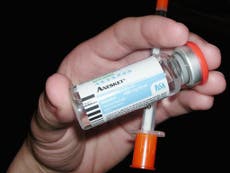Is ketamine the new wonder drug for depression? As someone who's struggled with traditional methods, I'm hopeful – but cautiously so
When you are at your lowest and most vulnerable, it can feel like there is no way out, so to have something available which could potentially offer fast relief is worthy of further consideration


After years of trying to treat my depression through pills, trial and error, I was surprised and hopeful to discover research that shows ketamine could be the new wonder drug.
You may think of ketamine as an anaesthetic, or as a Class A party drug, which can be horribly misused and cause serious physical and mental health issues. According to Talk To Frank it can even contribute to the development of depression and can cause hallucinations.
However, I am also aware of the need for a wider and better range of treatment for mental health issues. I had difficulty finding success with traditional treatments. As a result I am always keen to hear about any further developments or breakthroughs when it comes to helping or managing depression.
The proposed nasal spray reportedly relieves symptoms of suicidal thoughts and severe depression within 24 hours. Normal selective serotonin reuptake inhibitors take at least four weeks to start working effectively and quite a lot of patients don’t have that kind of time when in the midst of a crisis.
The report by researchers from Janssen Research and Development and Yale School of Medicine also suggested that this nasal spray treatment worked well in the short term and could be used to help bridge the gap between the time when someone begins taking antidepressants and when they start feeling their effects. It sounds like it could be a brilliant idea.
When you are at your lowest and most vulnerable it can feel like there is no way out, so to have something available which could potentially offer fast relief seems incredible or at least worthy of further consideration.
It is not a completely new idea to use ketamine as a treatment for depression. Previous trials have looked at using it orally and intravenously, with more success via the latter method. A nasal spray seems like a happy medium: it is much less invasive and an easier way of administering the medication. It could help those who haven’t had success with other drugs, as well as helping people to avoid resorting to other controversial treatments such as electroconvulsive therapy, which some patients find to be incredibly violating.
If it can pass a phase three trial with a larger patient sample and continue to demonstrate positive results I believe it could be a useful tool in helping those most in need.
For all the good news, I have some major concerns about the potential to misuse and abuse ketamine prescriptions.
A drug can be both legal and addictive. Just look at the high level of misuse of prescription painkillers. Three decades ago, opioids were marketed in the US as a form of chronic pain treatment that was non-addictive. We now know that this is not the case. The Centres for Disease Control and Prevention found that around 20,000 people died in 2016 in the US from overdosing on synthetic opioids.
It has also been a problem for the UK. For example, television presenter Ant McPartlin is publicly dealing with substance abuse issues, which were rooted in an addiction to heavy painkillers that had been originally been prescribed to him. Ketamine is already a drug that is well known for being highly abused. How sure can we be that there won’t be similar problems if people take it for depression?
People can also react to different drugs in different ways. In this instance, ketamine can induce or worsen psychosis and consequently can have a damaging rather than useful effect. When we are using anything that can alter our brain chemistry there needs to be an element of caution. How many people would have negative side effects? How severe are they? If we are expecting vulnerable people to use this medication we need to be sure that it will help the majority of users.
Having said that, I also know how other drugs that are used to help treat depression are not always effective. Traditional antidepressants can cause suicidal thoughts, especially in younger adults.
There are limitations to all treatments and people have completely different responses to them. Despite my concerns about using ketamine, having been through an intense crisis myself, I can’t help but be drawn to the idea of fast relief.


Join our commenting forum
Join thought-provoking conversations, follow other Independent readers and see their replies